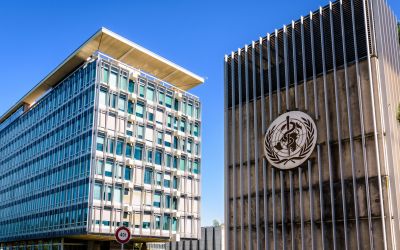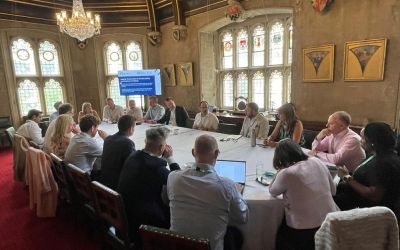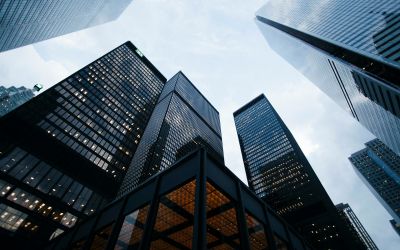Steven Kukoda on how investment in copper is critical for a circular economy
Ahead of the Sustainable Innovation Forum 2019 taking place in Madrid, Spain on the 10-11th December, we caught up with Steven Kukoda, Executive Director at the International Copper Association, to discuss how investment in copper is critical for a circular economy.

Ahead of the Sustainable Innovation Forum 2019 taking place in Madrid, Spain on the 10-11th December, we caught up with Steven Kukoda, Executive Director at the International Copper Association, to discuss how investment in copper is critical for a circular economy.
Q. Let’s start with some background on the International Copper Association and its long-standing contribution to the circular economy.
Copper’s contribution to a circular economy begins with its inherent recyclability. Copper is infinitely recyclable without any loss of properties, whereas other metals lose some of their properties during the recycling process. We estimate that two-thirds of the copper produced since 1900 is still in productive use. Furthermore, today, about one-third of the annual copper demand is met with recycled metal - a number that is expected to grow further in the future.
Some copper industry leaders are already implementing solutions. La Farga Lacambra in Spain has a closed circle production system whereby it produces semi-finished products using the secondary copper that it produces. To do so, La Farga uses its own technology, allowing for copper that is 99.9 percent pure to be obtained from copper scrap.
Meanwhile in Germany, Aurubis is extracting CO2-free surplus heat from copper production and delivering it to HafenCity East, near Hamburg, through a 3.7-kilometre pipeline. The project saves 20,000 tonnes of CO2—equivalent to about 10,000 cars driving 12,000 kilometres—per year. The project means HafenCity East is the first city neighborhood to be entirely supplied with CO2-free industrial heat.
And finally, Metallo in Belgium is also innovating to close the loop. Its ground-breaking new plasma oven allows the company to recycle low-grade materials in such a way that they can be turned into high-grade metals and minerals.
Q. Copper is infinitely recyclable and therefore critical to the circular economy, what would you consider to be the most exciting opportunities for copper to increase the circularity of products/sectors in the future? What investment, policy and regulatory support is needed to realise them?
Several long-term trends are already driving growth in copper demand and are expected to continue to do so. These trends include increased consumer use of electronics, wider uptake of electric vehicles, increased use of renewable energy sources and energy efficiency. All of this means more copper, with research showing that demand could jump by as much as 50 percent in just the next 20 years.
Given this expected increase in demand, the industry continues to strive for higher recycling rates to not only make the industry more sustainable but to conserve more of the planet’s natural resources. To maintain a stable supply of recycled copper and newly mined copper in a sustainable way, there must be investment from industry and the political stability necessary to allow this investment to happen. Stable permitting frameworks also ensure environmental standards and community engagement are implemented and upheld.
Q. The International Copper Association has been in partnership with the United Nations for over 20 years, how important is such a partnership for delivering the SDGs? What would you consider to be the key and/or most unexpected benefits?
We are indeed proud of our long-standing relationship with the UN. Over the last twenty years, we’ve seen a positive shift towards the inclusion of the private sector in initiatives to address the SDGs. It is recognised – on all sides – that working together brings about faster, more impactful action. For ICA, these partnerships have enabled us to scale-up our work (in particular on the clean energy transition) and to give us a presence in emerging economies. One key example of the United for Efficiency programme, of which we are a founding member with the UN and the UN Environment Programme. It brings together manufacturers and other technical organisations to achieve its goal of greater energy efficiency. Importantly, these partnerships provide tangible evidence of the copper industry’s commitment to sustainable development.
Q. In recent years, the circular economy has gained serious momentum, but the traditional linear approach remains the norm. What is needed at a national, city and industry level to transition the ambition into meaningful action?
Having the right policies in place is always critical, and a holistic approach is necessary to address a wide-ranging topic like the circular economy. Policies create a level playing field by setting baselines and take away ambiguity. In addition, large industrial companies and OEMs can put pressure on their supply chains to force more circularity. Responsibility in the supply chain and production is key. That is why ICA developed the Copper Mark, a new assurance system to assess the performance of copper mines and refiners based on responsible production criteria so investors and copper consumers can make more informed decisions. Finally, we live in an age of socially aware consumers, who can – and do – put pressure on governments and companies to shift business practices, including towards circularity.
Q. What is the importance of events such as the Sustainable Innovation Forum in supporting the advancement of the circular economy?
The Sustainable Innovation Forum puts a spotlight on important issues like the circular economy at a critical moment when world leaders are coming together to talk about climate change. Having the Sustainable Innovation Forum 2019 alongside COP25 provides a platform for organisations like ICA to engage directly with stakeholders we want to reach.
The International Copper Assoication is a Strategic Partner of the upcoming 10th annual Sustainable Innovation Forum taking place alongside COP25, 10-11 December in Madrid, Spain. To learn more about the agenda, the panels, the speakers and how to register, visit the event's official website here.






